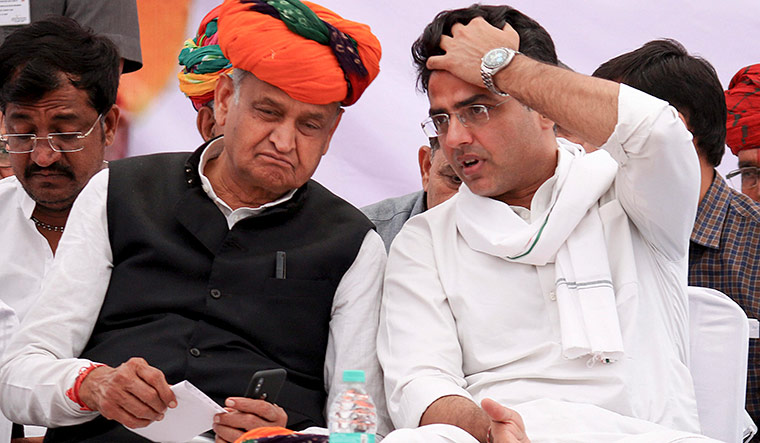The drama in Rajasthan is becoming 'curiouser and curiouser', as Alice (in Lewis Carroll's Alice in Wonderland ) would say.
In the 200 member Legislative Assembly, Sachin Pilot's camp initially claimed support of 30 out of the 107 Congress MLAs, but later it turned out they were only 19. With support of independents, Ashok Gehlot's ministry appears safe, at least for the time being. So if Sachin's design was to topple the Gehlot ministry and become CM himself, his attempt has apparently failed.
Sachin, who has been sacked from the post of Deputy Chief Minister and President of the state unit of the Congress, initially declared he would hold a press conference in Delhi on Wednesday, but now seems to have backtracked, and instead has issued a statement denying he was joining the BJP, and alleging that some people are trying to tarnish his image and lower him in the eyes of the Gandhis. He also reportedly said he had worked hard to defeat the BJP, so why should he join it?
How does one explain this volte face after the initial bravado?
It seems that having received notices from the Speaker of the Rajasthan Assembly under the anti-defection law ( the 10th Schedule to the Constitution), Sachin and his 18 supporting MLAs must have realised they may all be disqualified by the Speaker from membership of the Rajasthan Assembly.
Under section 2 of the 10th Schedule to the Constitution, a Member of Parliament or the state assembly gets disqualified if (1) he voluntarily gives up membership of his political party, or (2) he votes or abstains from voting in the House contrary to the directions given by his political party.
In Ravi Naik vs Union of India (1994) and Rajendra Singh Rana vs Swamy Prasad Maurya (2007), the Supreme Court held that the expression 'voluntary giving up membership of a political party' is not synonymous with formally resigning from a political party, but has a wider connotation. A person can be deemed to have given up his membership of a party by his conduct.
In the Constitution Bench decision in Rajendra Singh Rana's case, some MLAs of the ruling Bahujan Samaj Party (BSP) in UP went with some members of the opposition Samajwadi Party to the Governor of the state, and asked him to invite the opposition Samajwadi Party to form a government. Although these BSP MLAs had not formally resigned from their party, the Supreme Court held that by their conduct they had given up membership of the BSP.
This being the legal position, it is possible that Pilot and the 18 MLAs supporting him took legal advice, and may have been advised by their lawyers that even though they had not formally resigned from the Congress party, they had done acts which could possibly be interpreted as giving up membership of the Congress, e.g. not attending meetings of Congress MLAs on two occasions, although all Congress MLAs had been directed to attend, not paying heed to Congress leaders, and issuing defiant strong statements.
Under the 10th Schedule, it is for the Speaker of the House to decide the question of disqualification, not the court (though no doubt the Speaker's decision can be challenged in the High Court or Supreme Court). The Speaker being a member of the ruling Congress party in the state will almost certainly decide as he is told by the Congress leaders.
Realising his predicament, Pilot and his supporters seem to have caved in.
How things develop now has to be seen. It reminds one of the Mad Hatter's party in Alice in Wonderland.
Justice Markandey Katju retired from the Supreme Court in 2011
The opinions expressed in this article are those of the author's and do not purport to reflect the opinions or views of THE WEEK


